- europages
- >
- COMPANIES - SUPPLIERS - SERVICE PROVIDERS
- >
- injection moulding process
Results for
Injection moulding process - Import export
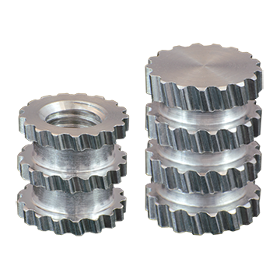
SPIROL
Germany
Moulded-In Inserts are placed over core pins by an operator or a pick-and-place robot prior to the closure of the mould cavity during the plastic injection process. Moulded-In Inserts offer exceptional torque and pull-out resistance due to unrestricted plastic flow around the Insert body, and are often the Insert of choice for thermosets and engineered plastics with a high percentage of filler. The minor thread diameter tolerance is controlled to ensure positive positioning and perpendicularity of the Insert on the core pin during the moulding process. Series 63 is symmetrical eliminating orientation and Series 65 is the same body style in a blind ended version. SPIROL's Moulded-In Inserts are made from 2024 aluminium, a light-weight, lead-free grade. SPIROL’s Series 63 and Series 65 Moulded-In Aluminium Inserts are available in thread sizes ranging from M4 (8-32) up to M8 (5/16-18).
Request for a quote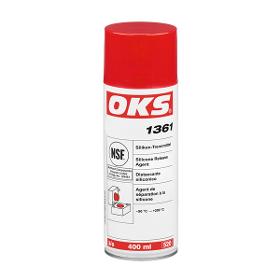
OKS SPEZIALSCHMIERSTOFFE GMBH
Germany
Parting agent for casting, injection moulding, blow moulding and extrusion processes of plastics and elastomers Prevents sticking, for example of excess adhesive and sealant Eliminates creaking and squeaking noises when surfaces made of plastics, elastomers and metals rub on each other For easy fitting of plastic and rubber profiles, e.g. in door and window construction Lubricant for cutting edges of paper, cardboard, veneer or textile machines, etc. Advantages and benefits NSF H1 registered Highly effective due to outstanding surface wetting and formation of separating film with antistatic properties Broad range of uses for long-term lubrication, protection, care and impregnation of material surfaces made of metal, plastic and rubber Minimal consumption through formation of extremely thin films Resistant to water and weathering Long spray tube for precision application MOSH/MOAH-free
Request for a quote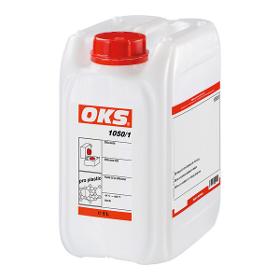
OKS SPEZIALSCHMIERSTOFFE GMBH
Germany
Parting agent at foundry operations injection moulding, blowing and extruding processes of plastics and elastomer Avoids the sticking of e.g. adhesives and sealing excess or water wetting Sliding agent against noisy rubbing of plastics, elastomers and metals together or against each other Lubrication of cutting edges in the paper, cardboard, veneer layer and textile processing machines For easy retracting of plastic and rubber profiles, e.g. in the door and window production Advantages and benefits High efficiency because of excellent netting of the surface and building of extremely thin lubricating films Separating effect with antistatic properties Manifold applications for permanent lubrication, protection, maintaining and impregnation Neutral behaviour against plastic and elastomers Resistant against water and atmospheric influences
Request for a quote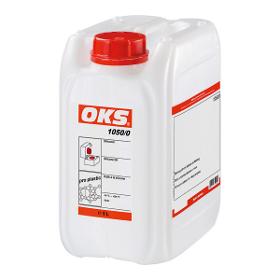
OKS SPEZIALSCHMIERSTOFFE GMBH
Germany
Parting agent at foundry operations injection moulding, blowing and extruding processes of plastics and elastomer Avoids the sticking of e.g. adhesives and sealing excess or water wetting Sliding agent against noisy rubbing of plastics, elastomers and metals together or against each other Lubrication of cutting edges in the paper, cardboard, veneer layer and textile processing machines For easy retracting of plastic and rubber profiles, e.g. in the door and window production Advantages and benefits High efficiency because of excellent netting of the surface and building of extremely thin lubricating films Separating effect with antistatic properties Manifold applications for permanent lubrication, protection, maintaining and impregnation Neutral behaviour against plastic and elastomers Resistant against water and atmospheric influences
Request for a quote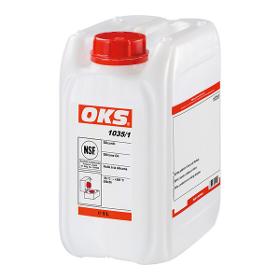
OKS SPEZIALSCHMIERSTOFFE GMBH
Germany
Parting agent at foundry operations injection moulding, blowing and extruding processes of plastics and elastomer Avoids the sticking of e.g. adhesives and sealing excess or water wetting Sliding agent against noisy rubbing of plastics, elastomers and metals together or against each other Lubrication of cutting edges in the paper, cardboard, veneer layer and textile processing machines For easy retracting of plastic and rubber profiles, e.g. in the door and window production Advantages and benefits High efficiency because of excellent netting of the surface and building of extremely thin lubricating films Separating effect with antistatic properties Manifold applications for permanent lubrication, protection, maintaining and impregnation Neutral behaviour against plastic and elastomers Resistant against water and atmospheric influences NSF H1-registered
Request for a quoteDo you sell or make similar products?
Sign up to europages and have your products listed

OKS SPEZIALSCHMIERSTOFFE GMBH
Germany
Parting agent at foundry operations injection moulding, blowing and extruding processes of plastics and elastomer Avoids the sticking of e.g. adhesives and sealing excess or water wetting Sliding agent against noisy rubbing of plastics, elastomers and metals together or against each other Lubrication of cutting edges in the paper, cardboard, veneer layer and textile processing machines For easy retracting of plastic and rubber profiles, e.g. in the door and window production Advantages and benefits High efficiency because of excellent netting of the surface and building of extremely thin lubricating films Separating effect with antistatic properties Manifold applications for permanent lubrication, protection, maintaining and impregnation Neutral behaviour against plastic and elastomers Resistant against water and atmospheric influences MOSH/MOAH-free NSF H1-registered
Request for a quote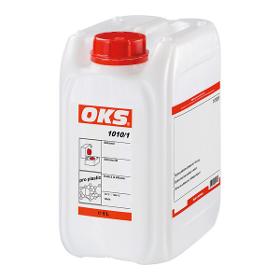
OKS SPEZIALSCHMIERSTOFFE GMBH
Germany
Parting agent at foundry operations injection moulding, blowing and extruding processes of plastics and elastomer Avoids the sticking of e.g. adhesives and sealing excess or water wetting Sliding agent against noisy rubbing of plastics, elastomers and metals together or against each other Lubrication of cutting edges in the paper, cardboard, veneer layer and textile processing machines For easy retracting of plastic and rubber profiles, e.g. in the door and window production Advantages and benefits High efficiency because of excellent netting of the surface and building of extremely thin lubricating films Separating effect with antistatic properties Manifold applications for permanent lubrication, protection, maintaining and impregnation Neutral behaviour against plastic and elastomers Resistant against water and atmospheric influences
Request for a quote
HEXPOL TPE GMBH
Germany
The EPSeal 400 series was developed for synthetic wine corks and T-stoppers for spirits. Various grades are available for both extrusion and injection moulding process. The addition of foam masterbatch enables the user to reach individual customer specifications. The optimal slip systems we have developed allow for consumer friendly removal from the bottle mouth. Download EPSeal Product Guide
Request for a quote
HEXPOL TPE GMBH
Germany
In the injection moulding process TPE pellets are fed into the machine through a hopper and then into a heated barrel. The heat from the barrel turns the material into a liquid resin which is then injected into a closed mould under high pressure. After allowing the molten polymer to cool, the finished part can be removed from the mould. Injection moulding is a high-volume, high tooling cost process, the advanced properties of our TPE compounds deliver short cycle times allowing parts to be produced at a rapid rate. The information below is intended as a general overview, settings may vary depending on the specific grade selected. Please CONTACT US for detailed processing information Settings Equipment Conventional injection moulding machine Compression set At least 2:1. Special screws with short sections and higher compression ratios (3:1 to 4:1) may be good at low screw speeds Shrinkage Between 1.0% and 2.5% depending on the grade, type of application and location of the gate. Moul
Request for a quote
HEXPOL TPE GMBH
Germany
Lifoflex B038/B045 These special TPE grades do have a high bonding to PA6, PA66, PA12 in two component parts. Also to glass fibre reinforced polyamide materials (up to 40% of glass fibre) a high bonding strength can be achieved. Modification of the polyamide with a primer is no longer necessary. The outstanding properties of these TPE compounds, like a high service temperature range, high oil resistance, soft touch surface and high flexibility, offer a wide variety of possible applications. Lifoflex B038/B045 materials are very easy to process in injection molding. The wide processing window results in a lower rate of defective parts and faster cycle times. Properties: Very high bonding strength to PA6, PA66,PA12 (including glass fi bre reinforced polyamide) Wide hardness range, from 25 up to 90 Shore A Very good chemical resistance High oil resistance High service temperature range (-40°C up to +120°C) Easy processing Wide processing window Easy coloring with color masterbatches Sof
Request for a quote
HEXPOL TPE GMBH
Germany
The Lifoflex GA, GB and GC series are TPE compounds based on SEBS. They are suited to a wide variety of applications and are characterised by easy processing and high flexibility. Properties 0 to 90 Shore A hardnesses Different densities: 0.89 to 1.21 g/ccm Translucent, natural or coloured compounds available Resistant against aqueous solutions, inorganic acids and bases Physiologically harmless Easy processing in injection moulding Good adhesion to PP/PE Excellent mechanical properties Service temperature range from -40°C up to 100°C High flexibility UV resistant (suitable for outdoor use) Applications with food contact are possible Conforms with FDA, 10/2011/EC and EN71/3 (toys) Conforms to European directives 2002/95/EC (RoHS) and 2003/11/EC Recyclable Applications Consumer and household Sealing for storage boxes Soft-touch surfaces for packaging Two component grips for kitchen equipment Toys, wheels for toy cars Electronics - sealings and soft-touch coating for housings Sports a
Request for a quote
HEXPOL TPE GMBH
Germany
Lifoflex FLAM are a range of halogen-free flame retardant thermoplastic elastomers (TPEs) designed to meet the most demanding applications where resistance to ignition and burning are important features. Lifoflex FLAM compounds contain additives to give them better resistance to burning compared to general TPE grades. The range includes halogen, chlorine and antimony free grades which are low smoke and compliant with the Restriction of Hazardous Substances (RoHS) directives, offering flame retardancy without the use of polybrominated diphenyl ether (PBDE). Lifoflex FLAM 600 series Flame retardant TPE, halogen free, fulfils the specification of UL 94 V0 with 3mm wall thickness. Easy processing by injection moulding and extrusion. Lifoflex FLAM 700 series The Lifoflex UV FLAM 700 series fulfils the highest specifications of flame retardant materials and can be used for railroad applications. A profile tested to DIN 5510-2:2009-05 (preventive fire protection in railway vehicles), rec
Request for a quote
HEXPOL TPE GMBH
Germany
Thermoplastic Vulcanisate or TPV compounds are high performance materials designed for demanding and dynamic applications. They are composed of a highly vulcanised rubber phase dispersed throughout a thermoplastic matrix and combine the processing ease, efficiency and recyclability of a thermoplastic with the improved flexibility, low compression set and resistance to aggressive fluids of a vulcanised rubber. This combination makes TPV’s ideal for variety of applications in several markets such as automotive, construction and appliances. Our Dryflex V range offers: A wide range of hardness’ Grades that can be processed by injection moulding, extrusion, blow moulding and thermoforming Service temperatures of -60°C to 135°C Improved resistance to aggressive fluids such as oils, acids, bases and aqueous solutions Low compression set Low flex fatigue Lightweight parts Design flexibility Recyclability Excellent weathering and environmental resistance Download Dryflex V - Thermoplastic
Request for a quote
HEXPOL TPE GMBH
Germany
Dryflex SE is our standard TPE range. It is extremely adaptable and can be used advantageously in many applications. The compounds are easy to process and are optimised for injection moulding. We have developed endless formulations to fulfil different properties and application requirements to optimise the finished component. Grades with improved compression set properties, high temperature resistance or more cost efficient values are an essential part of today’s wide product spectrum. Key Properties Unfilled, semi-filled & filled series 30 to 90 Shore A hardnesses Translucent, black, natural or coloured compounds are available Good adhesion to PP & PE High flexibility Easy processing via injection moulding Good mechanical properties Applications with food contact are possible Service temperature range from -50°C to 125°C (unstressed) Conforms to European directives 2002/95/EC (RoHS) and 2003/11/EC 100% recyclable Processing Dryflex SE TPE compounds can be processed using con
Request for a quote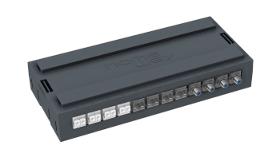
FRIEDENSTAB KUNSTSTOFFTECHNIK GMBH
Germany
With a modern machine park, we are able to produce injection molded parts up to approx. 400 grams. The materials used for this are e.g. PS, ABS, PP and PE, but also technical plastics. With a modern machine park, we are able to produce injection molded parts up to approx. 400 grams. The materials used for this are e.g. PS, ABS, PP and PE, but also technical plastics such as PA6, POM or IXEF are often used. Brief overview ARBURG injection molding machines Component weight: approx. 2 - 400 grams Closing forces: 50 - 220 tons Hybrid components (insert / outsert technology) Removal robots / vacuum gripping systems Automation around the injection molding process Central material handling system Material preparation Material drying
Request for a quoteResults for
Injection moulding process - Import exportNumber of results
16 ProductsCompany type